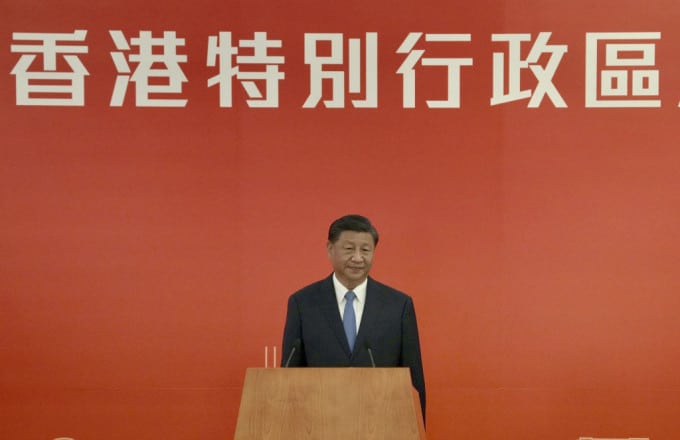Song Enrong, Deputy Director, Economic Research Center, Chinese University
Pan Xuezhi Research Assistant, Shanghai-Hong Kong Development Institute, The Chinese University of Hong Kong
The Basic Law promises that "one country, two systems" will remain unchanged for 50 years. Whether "one country, two systems" will continue to be implemented after 2047 is a key issue related to the future of Hong Kong. Although the Basic Law does not explicitly state that it must be changed after 50 years, the unresolved "second future issue" is approaching day by day, triggering different imaginations among the people. One extreme advocates "Hong Kong independence" and the implementation of complete autonomy, while the other extreme pursues "one country, one system" and direct jurisdiction by China. Many people believe that both are niche ideas, so we try to identify the social consensus through opinion polls.
Democratic Ideas launched the "One Country, Two Systems Index" on the 20th anniversary of Hong Kong's return to the motherland to regularly track the overview of "One Country, Two Systems" and commissioned the Hong Kong Asia-Pacific Institute of the Chinese University of Hong Kong to conduct random sampling telephone surveys every six months. Since mid-2017, 4 rounds of democratic thinking have been completed. tune. In the latest round of polls in December 2018, two new questions were asked to measure citizens’ attitudes towards the continuation of “one country, two systems” after 2047. The results are shown in Tables 1 and 2.
77% supports the subsequent implementation of one country, two systems in 2047
Table 1 shows the opinions of Hong Kong citizens on whether "one country, two systems" should continue to be implemented after 2047. The vast majority of citizens (76.5%) agreed, only a few disagreed (8.1%), and the rest (15.4%) said "don't know", proving that the continued implementation of one country, two systems after 2047 is widely supported.
The poll also asked citizens about their political leanings and found that moderates, non-establishment factions, and establishment factions accounted for 64.1%, 21.7%, and 11.3% of the adult population in order; non-establishment factions can be further subdivided into democrats and other non-establishment factions (mainly (for the localists and self-determinationists), accounting for 16.6% and 5.1% of the adult population respectively. It can be seen from the poll results that moderates represent the majority of society, while non-establishment and establishment factions are both a minority.
One country, two systems, future issues and expectations for Hong Kong
Divided by political leanings, support for the continued implementation of "one country, two systems" among different factions remains high. As can be seen from Table 1, the support among the establishment, moderates and democrats is very similar, ranging from 77% to 79%. Even though localists and self-determination parties often criticize "one country, two systems", "other non-establishment factions" dominated by these two factions still have 71.9% who agree to continue to implement "one country, two systems", which is a considerable number.
Continuing to implement "one country, two systems" after 2047 is the common goal of the entire political spectrum in Hong Kong.
The Communication and Public Opinion Research Center of the Chinese University of Hong Kong conducted two rounds of telephone surveys in 2016 and 2017, focusing on the future of Hong Kong after 2047, asking citizens whether they supported or opposed Hong Kong's maintenance of "one country, two systems". The support level rose slightly from 69.5% to 71.21 TP3T. Although the wording of this poll is different from that of the questionnaire on democratic ideas, and the results are not suitable for direct comparison, both reflect that "one country, two systems" is the answer that most citizens expect for the future of Hong Kong.
In the survey on democratic ideas, if citizens agree to continue to implement one country, two systems after 2047, the interviewer will further invite them to select from the following list conditions that are conducive to continuing to implement one country, two systems after 2047, including: "maintaining a high degree of autonomy", " "Maintain economic prosperity and stability", "Further democratize the political system", "Complete 23 pieces of legislation" and others (you can choose more than one).
Favorable conditions to maintain a high degree of autonomy, prosperity and stability
Table 2 shows the proportion of citizens choosing each condition according to political orientation. The overall citizens' choices are quite pragmatic. "Maintaining a high degree of autonomy" (33.6%) and "maintaining economic prosperity and stability" (31.3%) are the top two options, and their support levels are very close. "Further democratization of the political system" (19.5%) is a relatively minor third option. "Complete 23 pieces of legislation" (6.5%) ranked last.
If divided by political leanings, citizens' choices are distributed differently. "Maintaining a high degree of autonomy" is the primary choice of democrats (35.1%) and moderates (35.1%). However, for the pro-establishment camp, "maintaining economic prosperity and stability" (38.2%) is more important than "maintaining a high degree of autonomy" (21.9%).
"Further democratization of the political system" is the first option of "other non-establishment factions", mainly localists and self-determination factions (40.4%), but it is also the last option of the establishment faction (10.7%). "Completing 23 pieces of legislation" is the last option ranked by moderates (5.5%) and democrats (0.6%), but it is more valued by the establishment camp (21.7%).
"Maintaining a high degree of autonomy" and "maintaining economic prosperity and stability" are solid consensus among different political factions, while "further democratizing the political system" and "completing 23 pieces of legislation" are more controversial.
Moderates are the majority, and their choices represent the mainstream values of society. They attach great importance to "maintaining a high degree of autonomy" (35.1%) and "maintaining economic prosperity and stability" (32.7%). The secondary option is "further democratizing the political system" (17.6%), and "completing 23 pieces of legislation" ranks far behind. (5.5%), indicating that mainstream public opinion does not attach importance to maintaining national security; even for the establishment, "maintaining economic prosperity and stability" (38.2%) is obviously more important than "completing Article 23 legislation" (21.7%).
Contradictions between institutional and non-organized institutions in safeguarding national security
Hong Kong has experienced more than 150 years of colonial rule. Historically, Hong Kong people have been "aliens" and citizens do not attach importance to maintaining national security. However, for citizens of any country, maintaining national security is a basic national responsibility. Maintaining national security is an important conflict between "one country" and "two systems" and between the establishment and non-establishment factions. The core of many controversies over the legislation of the National Anthem Law, the revision of the Fugitive Transfer Ordinance, and the completion of Article 23 legislation is to maintain national security. .
Regardless of whether they are radical or conservative, the mainstream expectation of all political factions is to continue "one country, two systems". However, our survey also found that citizens do not have a high evaluation of the current "one country, two systems": on a scale of 0 to 10, citizens' The overall score is only 4.84 points, slightly lower than the median of 5 points.
Just like any unprecedented system, it is to be expected that difficulties and challenges will be encountered in the implementation of "one country, two systems". Why do citizens have reservations about the current situation of "one country, two systems" but still widely agree on the continuation of this system after 2047? It is obvious that Hong Kong citizens have a pragmatic attitude and are well aware that other options are not feasible. However, their concerns about the current situation cannot be ignored, and the situation deserves vigilance from those in power.
Hong Kong citizens do not attach great importance to the basic national responsibility of safeguarding national security. This is due to historical factors and will take time to resolve. I believe that this contradiction will eventually be alleviated and the sharp confrontation in society will also cool down. The sentencing of Occupy Central cases marks the passing of a historical stage: violators should bear responsibility, which is the minimum requirement of a society governed by the rule of law; for protesters, it is also a matter of seeking benevolence and receiving benevolence. Hong Kong society needs to find a way forward with a rational and pragmatic attitude and transcend the five-year confrontation of Occupy Central.
Looking forward to the future, there are still less than 30 years left before the "2047 deadline". Since the continuation of "one country, two systems" is a cross-sectarian consensus, all political parties should follow the spirit of "seeking common ground while reserving major differences", avoid letting the discussion lose focus, and focus on creating a favorable situation. The conditions of "one country, two systems" will continue to be implemented after 2047.



